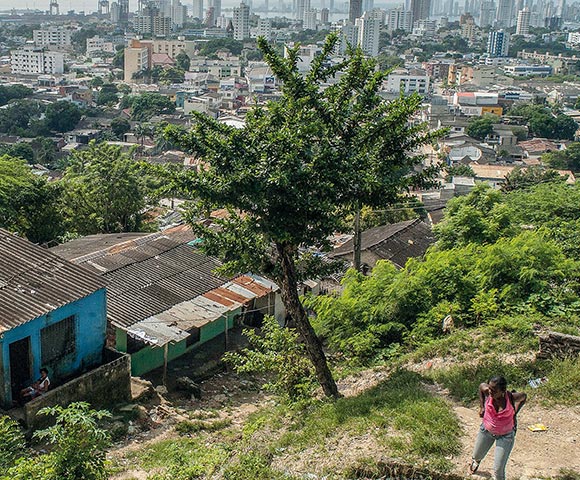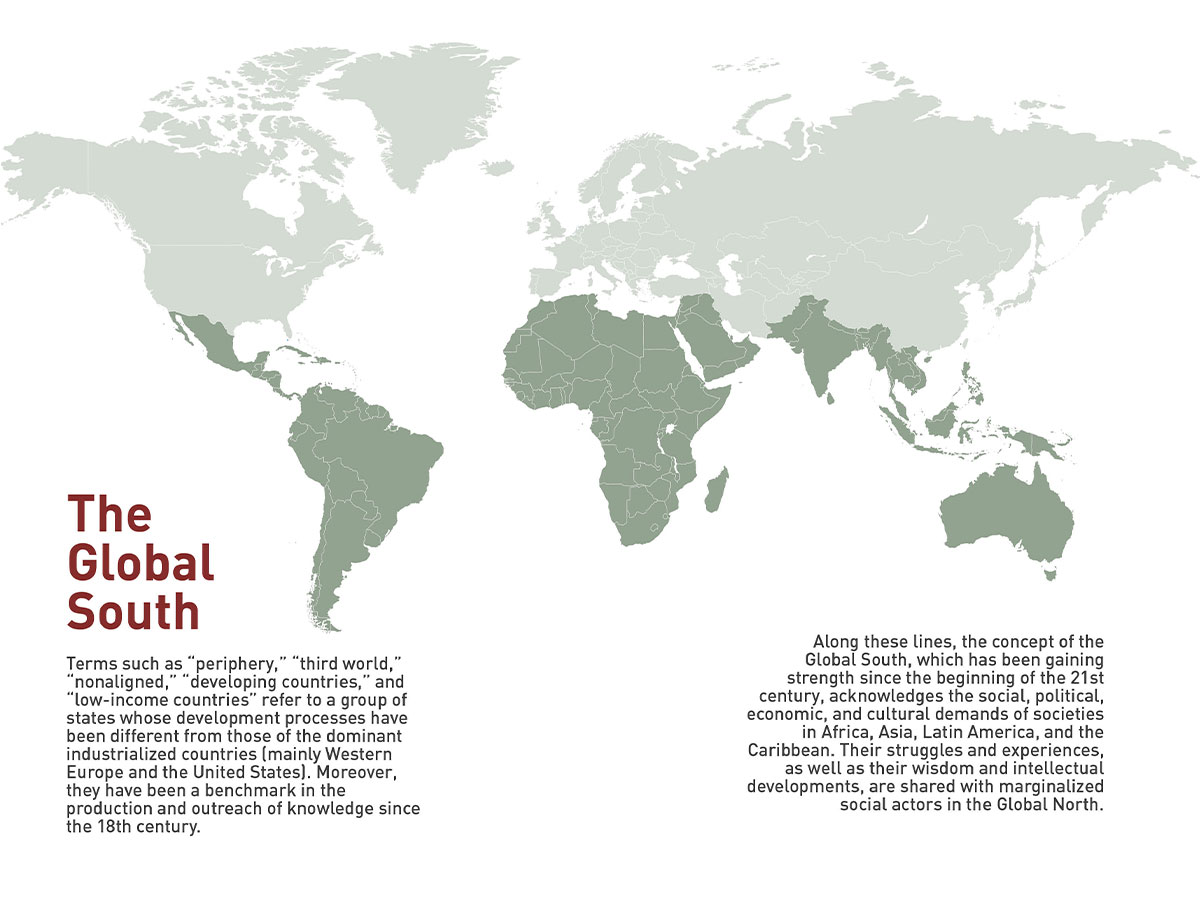Speakers from the Global South explain how the world interacts
By: Juliana María Vergara Agámez
Photos:
Economics and Politics

By: Juliana María Vergara Agámez
Photos:
Today, a class on International Relations in any university in the world can begin with the story of Hugo: a railway employee in Argentina who, owing to the privatization of the company where he had worked for years, lost his income, his social security, and the role that gave him his identity in society.
Other stories like this one—with the elements of reality and even cinematic fiction— serve as an introduction to each of the 15 academic articles written from different parts of the world that are gathered together in International Relations from the Global South: Worlds of Difference This is the most recent publication edited by Arlene B. Tickner, a professor at the Faculty of International, Political, and Urban Studies at Universidad del Rosario, and Karen Smith, from Leiden University (The Netherlands). The four-part work covers the discipline of International Relations, its key concepts and categories, and the global problems and possible futures from the diverse perspectives offered by the Global South.
To understand Eurocentrism in general, and in fields such as International Relations in particular, we must return to the eighteenth and nineteenth centuries, when the European powers consolidated a new form of domination from a single, limited vision of the world.
In contrast, as the editors highlight in the introduction, during the last two decades, the growing interest of scholars in the Global South and the non-West has led to the publication of numerous works that criticize the supposed universality of categories such as sovereignty, state, secularism, and security, and analyze different concepts of international relations as they have actually been experienced, made problematic, and theorized in different parts of the world.
Carolina Cepeda, an assistant professor in the Department of International Relations at Pontificia Universidad Javeriana, and the author of the article dedicated to “Resistances”, explains that the Global South arises from the revindication of the third world and from the Nonaligned Movement, but without the pejorative charge. “It is a way of understanding the asymmetrical relations between the rich countries, with greater technological development, and the countries of Latin America, Asia, and Africa,” she says.
It was precisely the story of Hugo, the former railway employee, that allowed her to put a face to the impact of neoliberal policies on ordinary people. This leads her to affirm that the value of the publication lies in gathering different interpretations of life, regardless of what happens in powerful states.
In turn, Professor Arlene B. Tickner recounts that these stories were the most complicated part for most authors because they were forced to abandon known fields in the transmission of knowledge to follow Western standards.
They had to go out into the street to find anecdotes, stories, and characters that allow teachers and students to explore these different perspectives that the publication brings to light, in which the value of other ways of reaching knowledge—created by people, organizations, and institutions in Latin America, the Caribbean, Asia, and Africa—is highlighted.
Approaching the concept of the Global South requires them to understand not only the acceptance of difference, the critique of discrimination, and inequality but also the defense of justice, all while keeping in mind the geographic, economic, and political connotations of developing countries, formerly known as third-world countries. An urgent task in a “very conservative and rigid” discipline—as Professor Cepeda points out—in which more critical trends are gaining strength, exploring other topics, and the social actors that generate changes in the politics of each country and at the international level are gaining relevance. The environmental movements or organizations that defend human rights are examples of this
"in Colombia, society’s awareness on the importance of international issues at a local level has been a slow process because this is a country that has prioritized the focus on its internal—not foreign—problems. Thus, if we ever ask ourselves what is the connection between international relations and everyday life, we should simply think about what we consume on a daily basis or the media we consult for information or entertainment.” Arlene Tickner
Starting with the Introduction by Professors Tickner and Smith, the text comprises 17 articles, divided into four parts. Part I (Discipline) discusses the current situation of international relations (as an academic field) in the world. Part II (Concepts) discusses and questions the key concepts in articles such as “Order, Ordering, and Disorder,” by Karen Smith, a co-editor of the book; “War and Conflict,” by Arlene B. Tickner; and “State and Sovereignty” by Professor Navnita Chadha Behera of the University of Delhi. Part III (Issues) reviews the problems faced by the discipline, with the contributions of scholars such as John M. Hobson, the University of Sheffield (Globalization); Joao Pontes Nogueira, Pontificia Universidad Católica de Sao Paulo (Inequality); and Carolina Cepeda, Pontificia Universidad Javeriana (Resistance). Part IV (Future) explores the possibilities of these approaches in the article “South–South Talk.”

Arlene Tickner, a professor at the Faculty of International, Political, and Urban Studies at Universidad del Rosario, explains that the work revolves around creating a network of international-relation academics to create an academic community. Given the difficulties to establish the lines of communication and exchange between academics located in different parts of the South or on the periphery, this is particularly important.
International Relations from the Global South is a product of the collaborative work of a nwork of scholars from around the world, who have been engaged in studying International Relations from dissident perspectives since the beginning of the 21st century. Its publication came amidst great expectations in the academic community because it is the first piece of writing that attempts to respond to the lack of pedagogical tools to talk about the issue from the Global South. The project took six years to develop and succeeded in bringing together alternative views on multiple concepts, categories, phenomena, and issues, as well as imagining alternative scenarios for future South–South conversations, without the North’s mediation.
the alternatives to each of the problems analyzed—from new projections—represent another strength of the book, which has now been made available by Routledge Publishers. Each chapter approaches issues such as order, sovereignty, security, inequality, and resistance from perspectives that are not usually seen in conventional approaches to teach International Relations. It is therefore not surprising that teachers in several coun - tries are already using the book, or some of its chapters, in their classrooms.
Tickner is very pleased with this, as the text seeks to raise awareness about the fact that, perhaps, the ways in which we have approached International Relations—from both teaching and research perspectives—do not appropriately and usefully reflect our international experiences. “First of all, we are inviting the states of the Global South and different actors located not only in the geographic south but also those who have been marginalized in the societies of the most developed countries, to be sensitive to the diverse experiences of the world.”
In this sense, networking has been the key for generating greater impact. Based on the motto “doing international relations differently,” several parallel initiatives are being developed. For example, one group studies the discipline of International Relations in different parts of the world: how it is taught, how it is researched, and how different geocultural factors affect these processes from a sociological perspective. Another group explores “relational ontologies” (which could be defined as the complex interactions between humans and everything nonhuman) derived from the worldviews and cosmologies of different social groups, including marginalized ancestral communities.
The results of this work are embodied in more than 25 publications in the Worlding Beyon the West series, of which Tickner is also a co-editor. It includes titles devoted to the emergence of new theories and approaches from the periphery, discipline’s sociology in different places, meaning and evolution of certain regions, and key concepts such as globalization and power, among other topics.
Regarding Latin America, Tickner explains that the work revolves around creating a network of international-relation academics to create an academic community. Given the difficulties to establish the lines of communication and exchange between academics located in different parts of the South or on the periphery, this is particularly important. Despite technological advances, one of the greatest ongoing challenges is creating direct communication channels between countries with similar experiences. “It does not mean that interaction with the North should not take place, rather, when knowledge passes through their filter, it ends up setting the agenda and conversation,” the professor clarifies.
Significant steps are being taken by these academics and their work to decentralize the generation and dissemination of knowledge in the field of International Relations, but there is still a long way to go. For example, one of the greatest contradictions of projects such as this one is that—for the sake of wider outreach—they are published entirely in English, although some authors have included sources in other languages in their bibliographies.
"No matter how much we advocate for difference,” Tickner acknowledges, “the medium to communicate that difference ends up being English, which is a colonial language.” Likewise, she recognizes that, for the time being, there is no other language that can group teachers from different parts of the world. Similarly, the cost of these texts may prevent students from countries in the Global South from accessing them on a large scale. Consequently, more affordable publishing options are being explored.
"Another particularly sensitive issue,” says the editor, “is that in Colombia, raising society’s awareness regarding the importance of international issues at the local level has been a slow process because the country has prioritized its internal problems and not what is happening abroad. Hence, if we ever wonder what the connection is between international relations and everyday life, we should consider what we consume on a daily basis or the media we consult for information or entertainment.”
Tickner explains that this observation also applies to phenomena such as migration or to problems that have directly affected Colombian society for decades, such as drugs and human trafficking, thus revealing the negative side of globalization in everyday life. For her, the question would be, “Is there a local element that is not crossed by some aspect of the global?”

Carolina Cepeda, an assistant professor in the Department of International Relations at Pontificia Universidad Javeriana, and the author of the article dedicated to “Resistances,” explains that the Global South arises from the revindication of the third world and from the Nonaligned Movement, but without the pejorative charge. “It is a way of understanding the asymmetrical relations between the rich countries, with greater technological development, and the countries of Latin America, Asia, and Africa,” she says.
